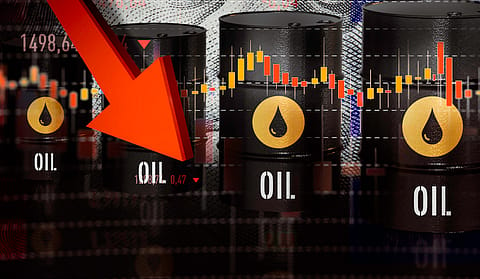Why are oil stocks ONGC, HPCL, Reliance, GAIL BPCL under pressure today?
Shares of oil marketing companies slipped up to 4% after the Central government cut the central excise duty on petrol and diesel.

Shares of oil marketing companies such as Oil Natural Gas Corporation (ONGC), Hindustan Petroleum Corporation Limited (HPCL), GAIL (India), and Reliance Industries fell up to 4% in intraday trade on Monday, in an otherwise positive broader market. The shares of oil retailers tumbled as traders weighed news of a cut in the central excise duty on petrol and diesel as well as ₹200 subsidy on LPG gas cylinders. The excise duty cut will have an impact on the marketing margins of oil companies in the current scenario when the retail prices remain somewhat elevated, leaving limited scope for further price hike.
In the oil and gas space, state-owned ONGC was the worst performer with a 4% loss. During the day’s trade so far, the largecap oil stock declined as much as 4.2% to hit an intraday low of ₹155, against previous closing price of ₹161.8 on the BSE. It underperformed the sector by 3.2%, with the BSE oil & gas index falling 0.75% lower at 18,859 points. In contrast, the BSE benchmark Sensex was trading 400 points higher at 54,724 levels at the time of reporting.
Among others, shares of government-controlled HPCL, Gujarat Gas, Indraprastha Gas, GAIL India, and BPCL fell up to 2% in intraday trade on Monday. The share price of Reliance Industries, the country’s largest private oil company, also dropped as much as 0.9% during the session.
In a bid to control rising inflation, the central government on Saturday announced reduction in the central excise duty on petrol and diesel, ₹200 subsidy on LPG gas cylinder, among others, which will cost over ₹1 lakh crore to the exchequer. The central excise duty on petrol has been reduced by ₹8 per litre and on diesel by ₹6 per litre, which will bring down the price of petrol and diesel by ₹9.5 per litre and ₹7 per litre, respectively.
In the last two months, petrol and diesel prices had been steady after several hikes in late March due to the energy crisis caused by the Russia-Ukraine war, which disrupted global fuel supply as the U.S. and its western allies imposed a ban on Russian imports. The domestic oil companies have raised fuel rates by more than ₹10 per litre since the ending of a four-and-half-month long hiatus in rate revision on March 22, when the results of five Assembly polls were announced.
In the recent past, oil companies have vastly outperformed the benchmark indices due to rising costs and decline in margins amid record spike in crude oil prices in the backdrop of Russia-Ukraine crisis. The rise in fuel prices comes on the back of Brent crude – the international benchmark – hovering around $110 a barrel after the Russia-Ukraine war. A stronger U.S. dollar against domestic currency has added to the cost of crude oil.